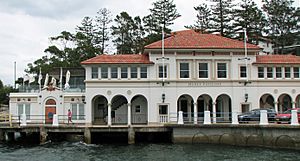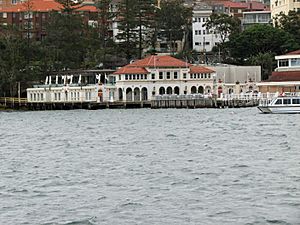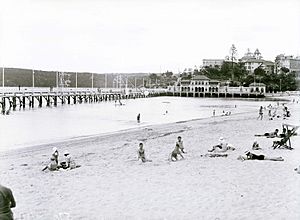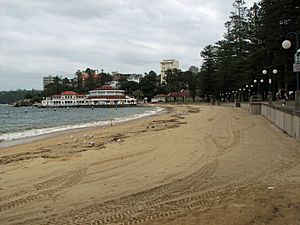Manly Cove Pavilion facts for kids
Quick facts for kids Manly Cove Pavilion |
|
|---|---|

Manly Cove Pavilion
|
|
| Location | West Esplanade, Manly, Northern Beaches Council, New South Wales, Australia |
| Owner | Roads & Maritime Services |
| Official name: Manly Cove Pavilion | |
| Type | State heritage (built) |
| Designated | 18 April 2000 |
| Reference no. | 1433 |
| Type | Restaurant (food outlet) |
| Category | Recreation and Entertainment |
| Lua error in Module:Location_map at line 420: attempt to index field 'wikibase' (a nil value). | |
The Manly Cove Pavilion is a special building with a long history. It's located on West Esplanade in Manly, Australia. This building used to be a place where people could change clothes and use public toilets. Today, it still has public toilets and also a restaurant.
The Manly Cove Pavilion is owned by Roads & Maritime Services, which is a government agency in New South Wales. Because of its importance, it was added to the New South Wales State Heritage Register on April 18, 2000. This means it's protected and recognized for its historical and architectural value.
Contents
A Look Back: The Pavilion's History
The Manly Cove Pavilion was built around 1933. This was a time between the two big World Wars. Back then, Manly was a very popular and stylish place for people to visit by the sea.
The building was put up by the Port Jackson and Manly Steamship Company. This company played a big role in bringing people to Manly.
What the Pavilion Looks Like
The Manly Cove Pavilion has a unique look. It's built in a style called "interwar Mediterranean." This means it has features often seen in buildings from countries around the Mediterranean Sea.
The outside of the building is mostly white. It's made of rendered brick, which means the bricks are covered with a smooth plaster. You can see pretty ceramic tiles used as decoration. There are also arched walkways, called a colonnade, on the ground floor.
The building has two floors and a tiled roof. It's built on a pier, which is like a strong support extending into the water. The columns in the colonnade have cool designs. These designs include fish, shells, and acanthus leaves. You can also see original wrought iron railings between the columns right by the water.
The walls of the pavilion have colorful tile designs. These designs use burnt orange and dark blue ceramic tiles. There's a pattern called a Greek key motif, and above it are half-circle tiles. More ceramic decorations, like scrolls and urns, are also part of the design.
The building has a strong Spanish feel to its design. The nearby public toilet block was built at the same time and matches the pavilion's style. Look for special details like the letter "M" made from tiles. You can also spot flower designs in the decoration near the roof, called a cornice. The original tiles on the walls and the wooden pagoda-style entrance are also special features.
Current Condition
The Manly Cove Pavilion is in good shape. Its outside still looks much like it did when it was first built. This helps it keep its original "interwar Mediterranean" style.
Changes Over Time
The inside of the pavilion was updated around 1980. This was when it was changed to include a restaurant.
Why the Pavilion is Special
The Manly Cove Pavilion is important for several reasons. It's one of the few buildings left in Sydney from that time period with this style.
It was officially listed on the New South Wales State Heritage Register on April 18, 2000. This means it meets certain requirements to be considered a heritage site.
- It shows us about history: The pavilion helps us understand how Manly grew as a popular seaside resort in the early 1900s.
- It's a great example of design: It's a well-preserved example of the "interwar Mediterranean" style. This shows how creative and skilled the builders were.
- It's a rare example: The pavilion is one of only a few structures like it left in Sydney Harbour from that time.
 | Kyle Baker |
 | Joseph Yoakum |
 | Laura Wheeler Waring |
 | Henry Ossawa Tanner |




